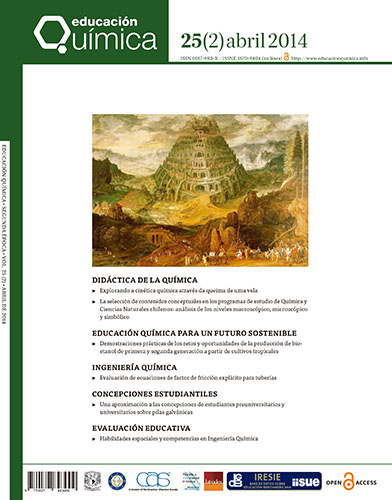Demostraciones prácticas de los retos y oportunidades de la producción de bioetanol de primera y segunda generación a partir de cultivos tropicales
Contenido principal del artículo
Resumen
La sociedad moderna depende del petróleo —una fuente no renovable— para obtener el combustiblenecesario para trasladar personas y productos. Actualmente existe el interés de desarrollar fuentesrenovables y procesos de producción de biocombustibles. Entre las más importantes está el bioetanolque se produce a partir de fuentes de carbohidratos mediante la fermentación microbiana, especialmentepor la levadura del pan (Saccharomyces cerevisiae). En este trabajo se presenta una serie deprácticas de laboratorio en las que los estudiantes desarrollan fermentaciones para producir bioetanolde primera (azúcares libres y almidón) y segunda generación (celulosa). Debido a que las zonastropicales de México y de otros países americanos se están considerando como las más propiciaspara el cultivo de las materias primas vegetales, se probaron fuentes de carbohidratos de estas regionestales como jugos (piña, caña de azúcar, uva y manzana), almidón de tubérculos (camote, papa ymalanga) y celulosa (hojas de caña y papel reciclado). Las prácticas se desarrollaron como investigacióndirigida y con ellas se aprenden y discuten los principios y los retos de la producción de etanolcomo biocombustible.
Detalles del artículo
Citas en Dimensions Service

Educación Química por Universidad Nacional Autónoma de México se distribuye bajo una Licencia Creative Commons Atribución-NoComercial-SinDerivar 4.0 Internacional.
Basada en una obra en http://www.revistas.unam.mx/index.php/req.




